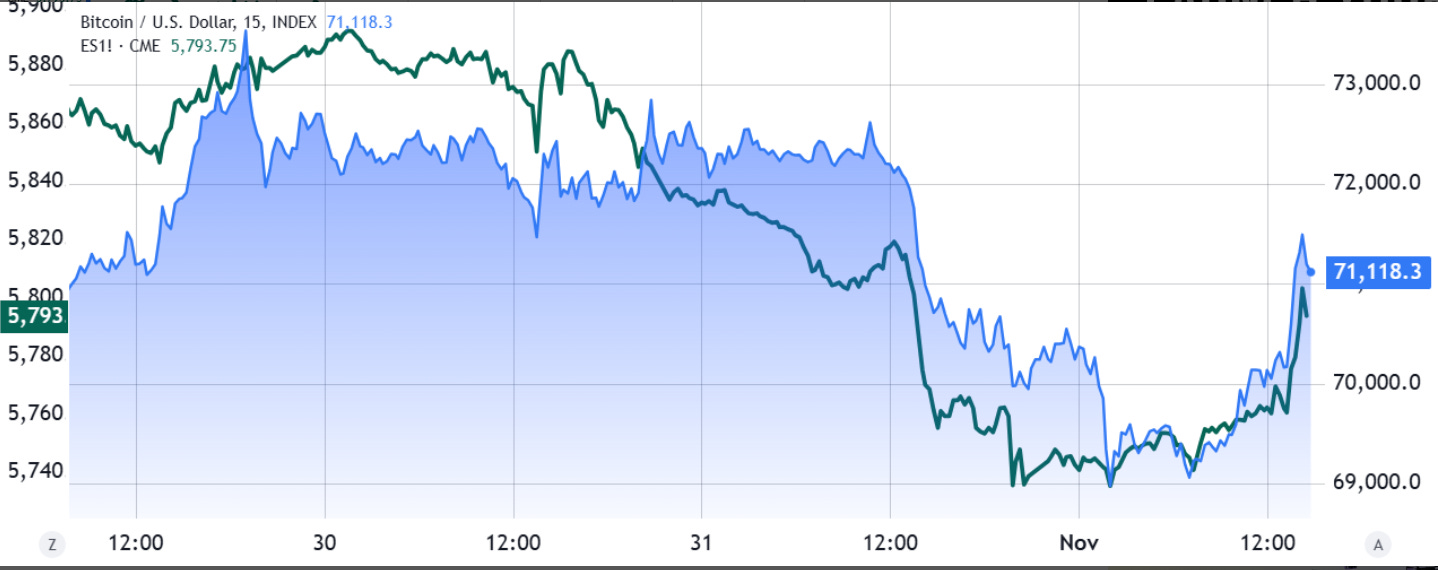The recent movement of Bitcoin's price can be closely correlated with movements in the S&P 500 index, indicating that both markets are responding to similar macroeconomic factors. This relationship underscores the interconnectedness of Bitcoin and traditional equity markets, particularly during periods of heightened economic uncertainty.
Correlation with the S&P 500
The chart illustrating S&P 500 futures alongside Bitcoin/USD from TradingView highlights this correlation. As market conditions fluctuate, traders often pivot their strategies based on broader economic signals that impact both asset classes.
Shift to Cash and Safe Havens
In the short term, as recession risks loom, traders frequently gravitate towards cash positions and Treasury bills, perceived as safer investments. This shift in sentiment has been reflected in the recent declines seen in both the stock market and Bitcoin prices, particularly following Intel's report of a 6% drop in quarterly revenue compared to the previous year. Such news tends to trigger caution among investors, leading to reduced appetite for riskier assets like cryptocurrencies.
Recent Corporate Disclosures
Recent financial disclosures from major tech companies, such as Microsoft and Meta, indicating an uptick in AI investments, have tempered expectations for earnings growth. This news was compounded by a dramatic 44% drop in Super Micro Computer (SMCI) shares within just three days, following an unexpected resignation of their auditor, EY. These events have contributed to a bearish market sentiment, further influencing Bitcoin's performance.
Labor Market Data and Inflation Concerns
On November 1, the mood shifted somewhat with the release of labor market data from the US Bureau of Labor Statistics, revealing a modest payroll growth of only 12,000 in October, significantly below the anticipated 100,000. Additionally, the 0.4% increase in US wages from the previous month has reignited inflation fears among investors. Despite these concerns, market analysts, as indicated by the CME FedWatch tool, are anticipating a 0.25% interest rate cut by the US Federal Reserve on November 7, which could have implications for both Bitcoin and equity markets.
Upcoming Political Events
With significant events on the horizon, including the US presidential elections on November 5 and the Federal Open Market Committee (FOMC) meeting, market participants should remain vigilant. Political efforts to stimulate the economy often lead to a depreciation of the US dollar, which can create upward pressure on Bitcoin prices in the medium term. As the landscape evolves, monitoring these developments will be crucial for traders and investors looking to navigate the volatile intersection of Bitcoin and traditional finance.
In summary, Bitcoin's price movements are intricately linked to broader economic indicators and investor sentiment. As macroeconomic conditions shift, so too will the strategies employed by both the Bitcoin and stock markets.
Reference: Google Finance, TradingView
Bitcoin mining in Africa is gaining traction as the continent seeks to leverage its vast natural resources and increasing access to renewable energy. With a growing interest in Bitcoin and the potential for economic diversification, Africa presents both opportunities and challenges for Bitcoin miners.
Key Factors Driving Bitcoin Mining Growth in Africa
Renewable Energy Potential: The continent has significant potential for renewable energy sources, such as solar, hydro, and wind. Countries like Ethiopia, South Africa, and Kenya are investing in renewable energy projects, making them attractive locations for Bitcoin mining operations.
Low Electricity Costs: In some regions, particularly those with abundant natural resources and renewable energy, electricity costs are significantly lower than in developed countries. This cost advantage can enhance the profitability of Bitcoin mining operations.
Growing Bitcoin Adoption: As interest in Bitcoin increases across Africa, there is a growing pool of local and international miners and investors. Initiatives to promote financial inclusion and digital assets are further driving this trend.
Challenges Facing Bitcoin Mining in Africa
Infrastructure Limitations: While some countries have made progress, many regions still face inadequate infrastructure, including unreliable power supply and poor internet connectivity, which can hinder mining operations.
Regulatory Uncertainty: The regulatory environment for Bitcoin varies widely across Africa. Some countries have embraced Bitcoin, while others have imposed restrictions or outright bans, creating uncertainty for miners.
Political Instability: Political instability and governance issues in certain countries can pose risks to mining operations. Countries facing conflict or significant corruption may deter investment in the sector.
Future Outlook
The future of Bitcoin mining in Africa holds considerable promise. As the global demand for Bitcoin continues to rise, the continent's potential for low-cost energy and resource availability can attract both local and foreign investments. Additionally, the push for financial inclusion through Bitcoin aligns with the continent’s broader economic goals.
Bitcoin mining in Africa is positioned for growth, driven by the continent's rich resources and increasing interest in Bitcoin. However, for the sector to realize its potential, stakeholders must address infrastructure challenges, navigate regulatory landscapes, and prioritize sustainability. By leveraging its unique advantages and addressing these challenges, Africa can become a significant player in the global Bitcoin mining industry.
MicroStrategy Announces $21 Billion Stock Offering to Boost Bitcoin Holdings
MicroStrategy has announced a potential sales agreement to issue up to $21 billion in Class A common stock, marking a significant move in its strategy to bolster its Bitcoin portfolio. While such a large stock offering typically raises concerns about shareholder dilution, MicroStrategy's stock has seen remarkable growth this year, reflecting strong investor confidence in Saylor's approach to leveraging capital markets for Bitcoin acquisition, despite fluctuations in Bitcoin prices.
This "at-the-market offering," facilitated by a consortium of sales agents, enables MicroStrategy to sell shares directly at current market prices, thereby minimizing the impact on existing shareholders. This strategy, known as "accretive dilution," allows the company to enhance its Bitcoin holdings while simultaneously improving overall shareholder value. With MicroStrategy's market capitalization surpassing that of other stocks, this approach reinforces its distinctive position within the Bitcoin ecosystem.
Reference: CoinDesk
Russia Lifts Bitcoin Mining Ban, Plans Expansion into BRICS Countries
On November 1st, Russia officially lifted its ban on Bitcoin mining and announced plans to establish mining and artificial intelligence facilities across BRICS countries.
Nico Smid, founder of Digital Mining Solutions, revealed that Russia aims to leverage underutilized energy sources in partnership with BitRiver, the Russian sovereign wealth fund. This initiative could facilitate BRICS nations in settling global trade transactions in Bitcoin, providing an alternative to local currencies backed by gold.
Originally comprising Brazil, Russia, India, China, and South Africa, BRICS will expand in 2024 to include Egypt, Iran, Saudi Arabia, Argentina, Ethiopia, and the UAE. Notably, Argentina, Ethiopia, and the UAE are already engaged in Bitcoin mining using state-owned resources. Alen Makhmetov of Hashlabs Mining pointed out that Russia's initiatives could provide geopolitical advantages, especially in regions with limited IT infrastructure.
While the ban has been lifted, miners in Russia must now register with the Federal Tax Service and disclose details about their equipment. Makhmetov cautioned that challenges persist, such as rising electricity costs and the devaluation of the ruble, which could make mining increasingly expensive.
Reference: Cointelegraph
Freed from Prison, Binance Founder CZ Receives Welcome in Dubai, Predicts 2024 as a Recovery Year
Freed from prison, Binance founder Changpeng Zhao (CZ) received an enthusiastic ovation during his appearance in Dubai, where he expressed optimism about the future of cryptocurrency. He suggested that 2024 could mark a recovery year for the market, potentially paving the way for a bull run in 2025.
CZ pointed to historical market cycles as indicators of a forthcoming rebound, emphasizing the need to support industry builders. He showed particular interest in projects that combine AI with blockchain technology, believing they hold significant potential for growth and utility as cryptocurrency adoption increases.
Discussing the regulatory landscape, CZ highlighted a positive shift in legislative support for cryptocurrency, spurred by public demand. He stressed the importance of clearly defining cryptocurrencies within U.S. law, noting the ongoing debates about their classification.
In addition, CZ unveiled his vision for Giggle Academy, a digital platform aimed at providing educational resources to those without access, particularly in impoverished regions. By leveraging AI to create interactive tools and fostering peer mentorship, the initiative seeks to empower up to 100 million people with education while prioritizing social impact over profit.
Reference: CoinDesk, TheBlockBeast
Empowering El Salvador: HCM Capital Supports Bitcoin Education with
HCM Capital is proud to support this dedicated non-profit organization focused on Bitcoin education-Mi Primer Bitcoin. Monthly meetups like these are crucial for fostering local engagement and strengthening the Bitcoin ecosystem. Together, let’s continue to empower communities worldwide!
Reference: X.com
Lifpay Bolt Card Feature relseased!
Reference: X.com
















